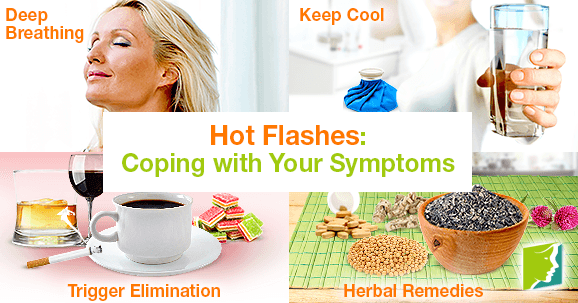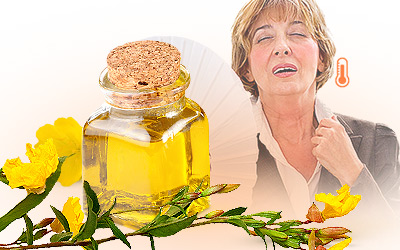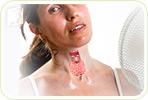The symptoms of hot flashes can be overwhelming at times, and it may seem like there is no way to cope. The burning heat, excessive sweating, rapid heartbeat, and shallow breathing can really do a number on your ability to make it through each day.
Since these heat episodes are so unpredictable, it is important to be prepared at all times. By enacting some simple lifestyle adjustments, you won't be as likely to fall into a helplessly fiery circumstance. Keep cool and collected to reduce and prevent hot flashes.
Deep Breathing
Practice deep, slow breathing for milder hot flashes. Although it is good to inhale and exhale slowly and fully while in the midst of a hot flash, it is also advantageous to practice regardless so that you are fully prepared when one arises.
Research has suggested that having a routine of paced breathing - six breaths per minute for 15 minutes once or twice a day - can greatly decrease your risk of getting a hot flash. Even if a hot flash does arise, your ability to deepen and calm your breathing can slow your heart rate and make symptoms less intense.
Keep Cool
Many women forget this essential coping method. Keeping cool means drinking enough cold water, keeping the temperature of your house low, and carrying around an ice pack if necessary. In the winter, no matter how cold, keep nearby windows ready to be cracked. In the summer, set the fan or air conditioner low. When you go out, make sure to have an ice pack or handheld fan, and ensure you're dressed in easy to remove layers. Also, drinking enough water is essential, this is how your body cools itself. The equivalent of 8 - 10 glasses a day is suggested for optimal coolness.
Trigger Elimination
Triggers can really set apart mild, manageable hot flashes from swelteringly invasive ones. When it comes to food, try to keep sugary, spicy, and fatty foods to a minimum. Also, try to avoid caffeine, alcohol, and cigarettes, as these substances can trigger a hot flash in some women. By keeping a journal, you can pinpoint what things trigger hot flashes for you.
Further, if you lead a stressful life, it would be helpful to incorporate yoga or meditation into your daily routine. These relaxation methods can help to decrease the incidence of hot flashes and other menopause symptoms.
Herbal Remedies
Some herbal supplements can help restore estrogen levels, which naturally decline during menopause. Balanced estrogen can regulate the hypothalamus and prevent adrenaline and cortisol from skyrocketing, which are the hormones that initiate and maintain hot flash symptoms.
Herbs like soy, black cohosh, red clover, and dong quai are full of phytoestrogens. This is significant because these compounds are received by estrogen receptors in the body and function in a similar way to this sex hormone. Find these plants whole, dried, or as supplements for a profound decrease in hot flashes.
Don't let your hot flashes get the best of you during this already difficult transition in life. Instead of letting them become a hindrance, make them the least of your problems with these useful, simple, and effective coping approaches. If you follow each step, relief from your sweating, redness, and heat should not be far away.
Sources
- Carmody, J. , Crawford, S. & Churchill, L. (2006). A Pilot Study of Mindfulness-based Stress Reduction for Hot Flashes. Menopause, 13(5), 760-769. Retrieved from http://www.ncbi.nlm.nih.gov/pubmed/16932242
- National Center for Complementary and Alternative Medicine. (2012). Soy. Retrieved June 25, 2014, from http://nccam.nih.gov/health/soy
- National Institutes of Health. (2012). Dong Quai. Retrieved June 25, 2014, from http://www.nlm.nih.gov/medlineplus/druginfo/natural/936.html
- Office of Dietary Supplements. (2008). Black Cohosh. Retrieved June 25, 2014, from http://ods.od.nih.gov/factsheets/BlackCohosh-HealthProfessional/
- Schilling, C. et al. (2007). Current Alcohol Use, Hormone Levels, and Hot Flashes in Midlife Women. Fertility and sterility, 87(6), 1483-1486. doi: 10.1016/j.fertnstert.2006.11.033
- Sood, R. et al. (2013). Paced Breathing Compared with Usual Breathing for Hot Flashes. Menopause, 20(2), 179-184. doi: 10.1097/gme.0b013e31826934b6
- Whiteman, M.K. et al. (2003). Smoking, Body Mass, and Hot Flashes in Midlife Women. Obstetrics and gynecology, 101(2), 264-272. Retrieved from http://www.ncbi.nlm.nih.gov/pubmed/12576249




